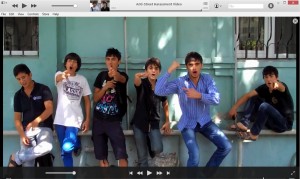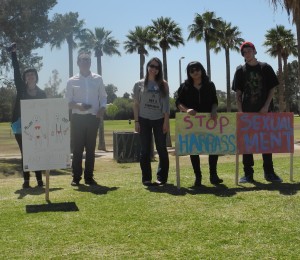Nov. 25 – Dec. 10 are the 16 Days of Activism Against Gender-Based Violence. To commemorate the week, we are featuring 1 activism idea per day. This information is excerpted from my new book Stop Global Street Harassment: Growing Activism Around the World (Praeger 2015).
Whether it’s by making art or a video or organizing a march, youth from Azerbaijan to the United States are undertaking creative ways to address street harassment.
 “What do you get when you annoy girls? They just think you are a bad person,” “You shouldn’t do it, bro,” and “Be a good man,” six teenage boys tell their peers in a mixture of Azerbaijani and English in a 2012 YouTube video. Jake Winn, an American youth development Peace Corps volunteer was in Azerbaijan, from 2010 to 2012 and had daily interaction with many young boys and men. He told me he noticed that “street harassment was a learned behavior and most were sincerely ignorant to the dangers and problems with street harassment.”
“What do you get when you annoy girls? They just think you are a bad person,” “You shouldn’t do it, bro,” and “Be a good man,” six teenage boys tell their peers in a mixture of Azerbaijani and English in a 2012 YouTube video. Jake Winn, an American youth development Peace Corps volunteer was in Azerbaijan, from 2010 to 2012 and had daily interaction with many young boys and men. He told me he noticed that “street harassment was a learned behavior and most were sincerely ignorant to the dangers and problems with street harassment.”
When he brought it up with them, there was little resistance to the idea that it needed to stop. It was just something they had never thought about. And for the boys and men who did think there was something wrong, he said, “they didn’t know how to bring it up, how to resist, how to convey a message to their peers that it wasn’t OK.”
After Winn showed the youth an American video of men telling other men to stop harassing women, the boys decided to make their own. “They wrote it, filmed it, edited it. … They loved making the video and were proud to show it,” Winn said. “Few had ever taken the time to think and reflect. It was great to see how inspired girls were to realize how many allies they had among the young men.”
To date, it has been viewed more than 6,000 times, and it received a standing ovation when it was shown at a youth film festival in Azerbaijan’s capital, Baku. Winn also developed a lesson plan and discussion questions for other Peace Corps volunteers to use with their own students, and more than a dozen volunteers did so. The materials are available on the SSH website in both Azerbaijani and English.

Hey Baby | Art Against Sexual Violence launched in Tucson, Arizona, through the Southern Arizona Center Against Sexual Assault in 2009. Inspired by an art-centric Hey Baby project in North Carolina, up to 50 students and 30 adults participate in the Tucson initiative each spring. Their artwork addresses themes of prevention and support for survivors of homophobia, street harassment, relationship abuse, rape, and child sexual abuse.
While the program is currently evolving, in the past, the art has been displayed in public libraries across Tucson during Sexual Assault Awareness Month and online. “I think it is important for youth to engage with troubling social issues in a context where they have control over the processes used to solve that problem,” the program’s manager (and SSH board member) Manuel Abril told me. “This means that instead of making youth [feel they] have to identify with social issues (social systems dispense blame for social problems affecting them onto marginalized communities) they are able to investigate it, to unravel it aesthetically, and to give it back to society.”
